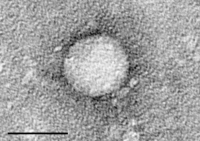
Photo from wikipedia
BACKGROUND The clinical relevance of genetic variants in nonischemic dilated cardiomyopathy (DCM) is unsettled. OBJECTIVES The study sought to assess the prognostic impact of disease-causing genetic variants in DCM. METHODS… Click to show full abstract
BACKGROUND The clinical relevance of genetic variants in nonischemic dilated cardiomyopathy (DCM) is unsettled. OBJECTIVES The study sought to assess the prognostic impact of disease-causing genetic variants in DCM. METHODS Baseline and longitudinal clinical data from 1,005 genotyped DCM probands were retrospectively collected at 20 centers. A total of 372 (37%) patients had pathogenic or likely pathogenic variants (genotype positive) and 633 (63%) were genotype negative. The primary endpoint was a composite of major adverse cardiovascular events. Secondary endpoints were end-stage heart failure (ESHF), malignant ventricular arrhythmia (MVA), and left ventricular reverse remodeling (LVRR). RESULTS After a median follow-up of 4.04 years (interquartile range: 1.70-7.50 years), the primary endpoint had occurred in 118 (31.7%) patients in the genotype-positive group and in 125 (19.8%) patients in the genotype-negative group (hazard ratio [HR]: 1.51; 95% confidence interval [CI]: 1.17-1.94; P = 0.001). ESHF occurred in 60 (16.1%) genotype-positive patients and in 55 (8.7%) genotype-negative patients (HR: 1.67; 95% CI: 1.16-2.41; P = 0.006). MVA occurred in 73 (19.6%) genotype-positive patients and in 77 (12.2%) genotype-negative patients (HR: 1.50; 95% CI: 1.09-2.07; P = 0.013). LVRR occurred in 39.6% in the genotype-positive group and in 46.2% in the genotype-negative group (P = 0.047). Among individuals with baseline left ventricular ejection fraction ≤35%, genotype-positive patients exhibited more major adverse cardiovascular events, ESHF, and MVA than their genotype-negative peers (all P < 0.02). LVRR and clinical outcomes varied depending on the underlying affected gene. CONCLUSIONS In this study, DCM patients with pathogenic or likely pathogenic variants had worse prognosis than genotype-negative individuals. Clinical course differed depending on the underlying affected gene.
Journal Title: Journal of the American College of Cardiology
Year Published: 2021
Link to full text (if available)
Share on Social Media: Sign Up to like & get
recommendations!